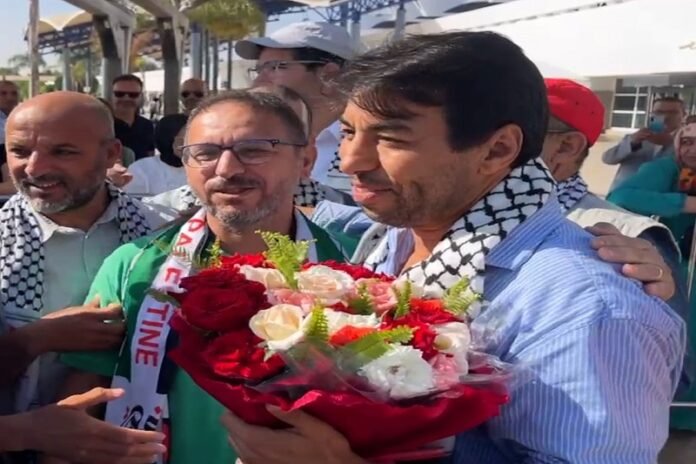The arrest of Moroccan journalist Mohammed El Bakkali, who was part of the crew aboard the “Handala” ship aiming to break the blockade imposed on Gaza, was far from a routine incident in the daily news cycle. It marked a pivotal moment that reignited debate over the Moroccan–Palestinian relationship and the delicate balance between the state’s diplomatic commitments and profound popular solidarity.
From the first hours of his detention, the Moroccan diplomatic machinery moved swiftly to manage the situation. The Moroccan Ambassador to Tel Aviv, Abderrahim Biyoudaine, immediately intervened to pursue El Bakkali’s case. A senior Ministry of Foreign Affairs official confirmed that:
“The Kingdom of Morocco, under the high instructions of His Majesty King Mohammed VI, President of the Al-Quds Committee, is closely monitoring the conditions of the arrest of the Moroccan citizen Mohammed El Bakkali and ensures his legal and diplomatic safety.”
In a previous press briefing, Foreign Minister Nasser Bourita stated:
“Morocco consistently remains committed to defending the rights of its citizens wherever they may be. This is an unchanging position,” adding that “the Palestinian cause remains one of Morocco’s strategic and emotional priorities.”
Meanwhile, social media platforms saw a broad wave of solidarity for journalist El Bakkali, with many framing his detention as a violation of press freedom and journalistic work in conflict zones. Prominent Moroccan journalist Younes Meskine expressed:
“What Mohammed El Bakkali did is at the core of professional and humanitarian commitment. The Moroccan state should protect such initiatives, not restrain them.”
Additionally, Abdelkebir Khchichen, president of Morocco’s National Syndicate of the Press, remarked:
“Detaining a Moroccan journalist carrying out humanitarian and international reporting can only be met with solidarity from the Moroccan journalistic body and an official stance against violations of fundamental freedoms.”
It is impossible to discuss this event without pointing to Morocco’s material initiatives on the ground: by royal order, the country dispatched over 180 tons of humanitarian aid to Gaza, including medical supplies, food, medicine, and blankets—an operation deemed the largest of its kind from a non-bordering state. Mohammed Salem Cherkaoui, director of the Bayt Mal Al-Quds Foundation, stated:
“Moroccan humanitarian action is not confined to rhetorical support; it manifests in concrete initiatives that affirm Morocco’s sustained commitment to the Palestinian people.”
Regional Context: An International Comparison of Morocco’s Posture
Within a regional context characterized by varied stances toward civil initiatives to break Gaza’s blockade, Morocco’s experience stands out as a model blending normalized diplomacy with popular humanitarian activism. Countries like Turkey and Tunisia organized similar efforts—such as the “Freedom Flotilla”—but Morocco’s approach was distinguished by active involvement of national syndicates and media bodies, adding a unique dimension that links official decision-making with popular resistance.
Details of the “Handala” Ship and the Interception Conditions
Organized by the Freedom Flotilla Coalition, the “Handala” mission set sail from the port of Syracuse, Italy, on July 13, 2025, carrying a diverse team of activists, human rights defenders, and journalists including Mohammed El Bakkali. The vessel was intercepted by the Israeli navy in international waters approximately 64–100 km off Gaza’s coast, and all detainees were transferred to Ashdod port.
Human rights organization Adalah described the incident as an “illegal maritime hijacking,” noting that activists initiated a hunger strike and refused to sign expedited deportation documents in protest of the detention conditions.
Israeli Perspective: Official Claims and Legal Controversy
Israel issued a statement via its Foreign Ministry on X, claiming that the interception was justified to thwart what it termed “unauthorized entry that violates security protocols,” reassuring that “passengers are safe” and that the operation complied with Israeli maritime law. However, no detailed official explanation regarding legal charges or reasons for arrest was provided, giving human rights groups and activists room to label the incident as arbitrary and demanding international accountability.
Questions & Internal Balance
The experience of journalist Mohammed El Bakkali once again reveals a sensitive divide—between the state and society, between political realism and ethical idealism. That divide requires careful and responsible management to avoid becoming a crisis of trust or symbolic conflict that weakens the state’s international position and disrupts internal coherence.
The central question becomes: will this incident restore meaning to popular solidarity and prompt the state to correct imbalances in its political and media discourse? Or is it an isolated case destined to fade like many before it?
In any event, Palestine remains deeply rooted in the Moroccan collective conscience, and El Bakkali stands as a mirror reflecting what many feel: Palestine is not an external matter… but an internal one.


